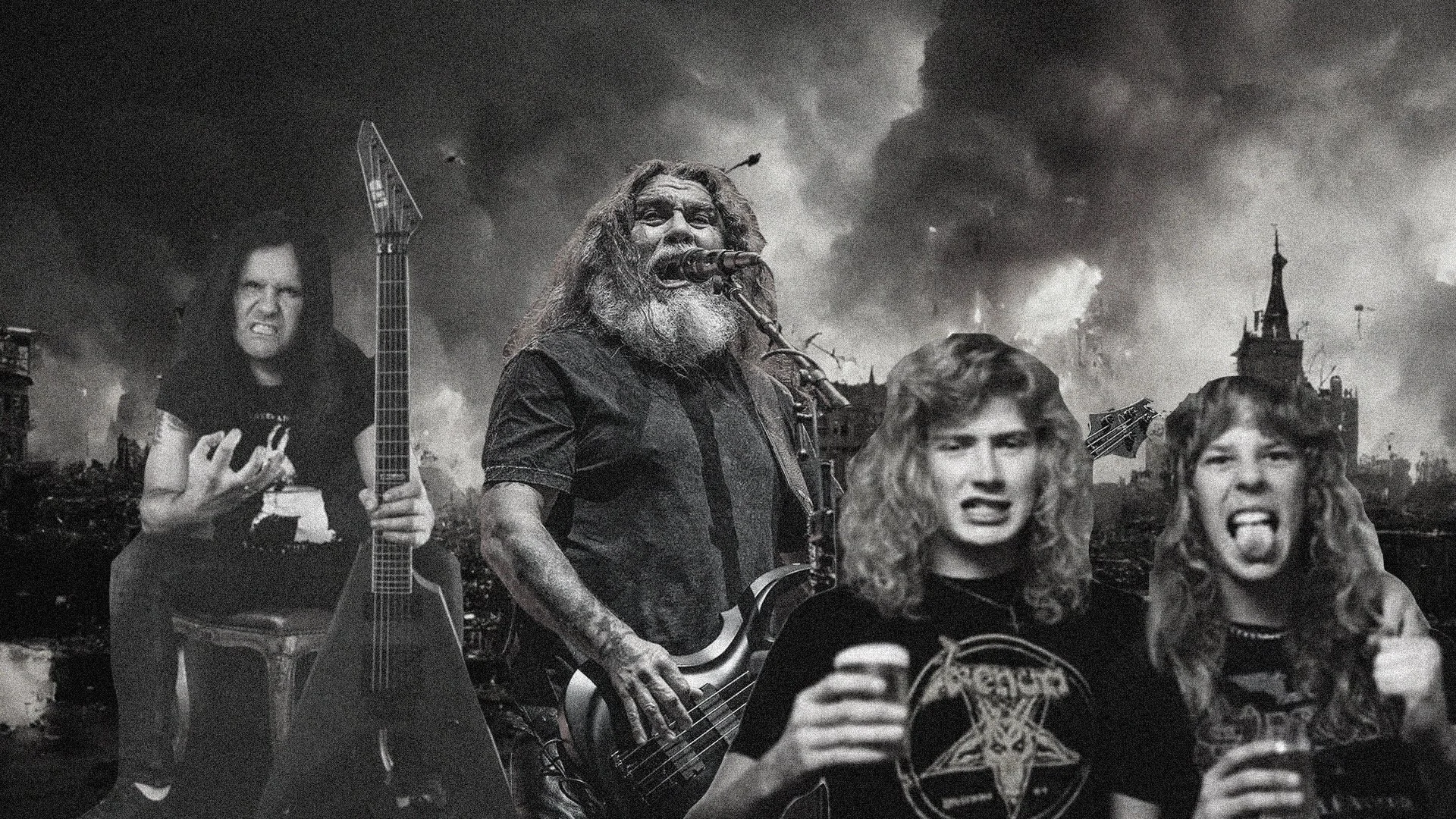A Subjective History of Heavy Metal
Metal was an accident. Sort of.
Seventeen years old Tony Iommi never meant to invent a new, dark rock that turned teenagers into Satanists. He was a blues and psychedelic rock guitarist and that’s what he wanted to play. Except he couldn’t. Iommi lost the tips of his middle and ring finger in an accident at the sheet metal factory hew was working for in 1965. He’s been telling whoever wanted to hear it ever since that his treating doctor told him he’d never play guitar again. According to the lore, it happened on his last day on the job too. Perhaps Satan organized it all, I don’t know. It’s plausible.
Tony wouldn’t take no for an answer. He was a stubborn teenager and he wouldn’t let fate dictate his future. Inspired by Django Reinhardt who played guitar with only two fingers, he found ways to keep doing what he loved. Iommi first considered playing right handed. Then he built home made thimbles to protect his fingertips from scraping on the guitar strings, but it wasn’t optimal. So, he downtuned his guitar before anyone knew what it meant in order to loosen the strings and play with as little pain as possible. Metal was invented. More or less.
What about the dark, spooky shit, right? That would come when Tony Iommi would meet a certain John Michael Osbourne, who you might also know under the name Ozzy. You know? The fucking prince of darkness and whatnot. Geezer Butler and Bill Ward too. It’s important to name them because as great as Ozzy is as a frontman, he’s an interpreter. He’s written very little music or lyrics in his life (and not all of them were great). As great as Ozzy’s stage presence is, Geezer and Bill were instrumental in turning him into the rock monster he is today.
They called themselves Earth at first, but there was another band in England called Earth, which had more success then they did. So they changed their name to Black Sabbath and decided they would play "dark blues" that reflected their love for horror movies and the overall shittiness of growing up in Birmingham, England.
An Etymology of Heavy Metal
But it wasn’t dark blues they were playing. It’s what they thought they did, but they weren’t.
Sabbath’s drummer Bill Ward initially coined the style "downer rock" using the already existing vocabulary of the time. It’s unclear who came up with the name heavy metal. Of course, it’s a reference to heavy metals in chemistry and metallurgy. Elements that are more dense than the rest of the periodic table and often toxic and dangerous, which gives a good picture of how heavy metal was being perceived when it was initially invented and, to a certain extent, is still being perceived today.
Metal historian Ian Christe claims the term "heavy" comes from hippies and that they used it to describe denser, more downbeat rock like Iron Butterfly. Ironically (or not), the interprets of the immortal psychedelic banger In-A-Gadda-Da-Vida released a record called Heavy in 1968. When I tell you metal was on the tip of everybody’s tongue in the end of the sixties, I shit you not. Critics of the era each used the term "heavy metal" heighten the sonic density of another style of music, like Jimi Hendrix’s blues or Keith Richards’ rock, but it’s unclear who had the idea first.
One thing is clear though. No one thought it was an actual genre of music before Black Sabbath came up with their first record Black Sabbath and their first ever recorded song, which also happens to be called Black Sabbath in 1970. These boys were simple and pure in their own way:
What the fuck is this gloomy ass shit?
Does this sound like metal to you? You can say no, but you have to admit : the moniker "downer rock" doesn’t quite capture what’s going on here either. With the thunder and church bell samples and the spacey, tragedian guitar tone floating through the airwaves like an inherent menace and Ozzy seemingly panicking upon learning the news of his damnation. This shit was new. No one else was doing it like this.
The limitations Tony Iommi had to respect in order to reinvent himself, the fucked up imaginary of Geezer Butler and intense interpretations of Ozzy Osbourne had channeled something different from the primordial ether. A dark invocation.
Now, the song Black Sabbath was more or less in a category of its own. A lot of the songs on that record are actual blues. I would say N.I.B is the only other proper metal song on Black Sabbath’s first record, but even then it was a lot closer to already existing psychedelic rock than Black Sabbath was. The bareness and the spontaneity of that song is still bone-chilling today even if we all understand it was interpreted by the goofy grandpa from that MTV reality show.
The question is now : who followed suit? I would discount Led Zeppelin from that argument because they were clearly interested in being rock stars and little else. They shared an interest in the occult, but they sang about doing drugs and getting laid with the occasional hobbit interlude. Don’t get me wrong, they were awesome. But they were very much a rock band in their musical structure and preoccupations. They did not give a flying fuck about being extreme and pushing the musical boundaries of anything. They were happy with being loud and sexy and provocative like rock stars are.
I mean, they literally have song called Rock n' Roll:
Some would say the second metal band was Deep Purple. Although they are grandfathered as a metal band by everyone and invited to play on every festival bill, let’s be honest : Deep Purple is a prog rock band. They were not interested in heaviness or fucked up imagery. They were hippies and music nerds who wanted to write long songs in funky time signatures. No, the second metal band to appear was, in my opinion, Judas Priest. Formed in 1969 in Birmingham (the same shitty abode that inspired Sabbath to invoke Satan for the first time), they didn’t release a record until Rocka Rolla, five years later in 1974.
The immortal Lemmy Kilmister would step down from Hawkwind a year later to form (in his own words) : “the dirtiest rock n’ roll band in the world” (and personal favorite) Motörhead. Even on his deathbed, Lemmy argued his band was rock and not metal, but that's another debate. Ronnie James Dio joined Rainbow around the same time. Iron Maiden became a thing in 1975. A lineage was starting to form. With the cultural explosion of punk rock in 1977, hybrid genres would become a thing and what once was an anomaly in rock music became a thing. Metal became its own subculture.
What the fuck is even Traditional Heavy Metal?
I don’t want to go deep into metal pioneers in this article for a simple reason. Bands who were considered heavy metal then were mostly reclassified into a specific subgenre later because metalheads are obsessive nerds who put so much of their identity in the bands they’re listening to, they can’t accept sharing their special thing with someone else unless they like the exact same bands.
Because of Rob Halford’s soaring vocals and their faster tempos, Judas Priest are often considered pioneers of speed metal. Motörhead are credited as the first true thrash metal bands for mostly the same reasons. Iron Maiden are labeled New Wave of British Heavy Metal (or NWOBHM) mostly because they’re British and their sound doesn’t fit anywhere else. OG’s like Witchfinder General and Cirith Ungol are called doom metal because of their slow tempos and grandiose vocals. You see what I mean? Heavy metal pioneers also belong to other genres. Heavy metal was a thing for some time and then it was splintered into hundreds of subgenres defined by quite creative, but OCD music nerds.
Don’t try to argue with a metalhead that his favourite band doesn’t really belong to the genre he claims it belongs to, you’re going to get stabbed in the face when you’re asleep. I’m going to explain in future articles how creativity and individuality invented metal subgenres, but let’s not overcomplicate this one already. Traditional heavy metal is an abstraction. It exists and it doesn't. It was a name we used before we found all the other names. I would put very little bands in that category today : Black Sabbath, Dio (and all his projects), Iron Maiden, Quiet Riot, not that many more. You'll see all of them in other subgenres too.
But let’s refocus on what matters here: Sabbath.
It all begins and ends with Sabbath, really
They are in retrospect, the only traditional heavy metal band that can be defined as such because they fucking invented the entire thing. By accident, but still. Technically, they also invented doom metal at the same time, but it’s also a conversation for another article down the line. Sabbath would not go big until their second album Paranoid (also released in 1970, like four months after the first) and their single Paranoid, which would give them the audience and the credibility to do whatever the fuck they wanted going forward. You know the song. You love it too:
Now, doesn’t that sound more like metal to you? Faster tempos, proto-chuggy riffs, a fucking guitar solo, that song (which was apparently written super fast) became huge and super influential. Because of Paranoid, kids would get inspired to start their own bands and would go on to become influential musicians of their own. It bridged the gap between what they were doing and other bands. Even today, it is known by even the people who don’t give a shit about Black Sabbath. That’s true transcendence right there. You know you’ve hit the spot if your song is known by Adele fans.
A lot of bands today still credit Black Sabbath for influencing how they sound. Stoner doom bands will swear that all they’ve ever done is rip off Sabbath and you know what? In some cases it’s true. They were that influential. But if Paranoid gave them enough credence to record whatever the fuck they wanted, the lovely Birmingham folks really started pushing their envelope on their third, fourth and fifth albums: Masters of Reality, Vol. IV and Sabbath Bloody Sabbath. In my opinion, they are the best things Sabbath has ever recorded.
The money they made with Paranoid also enabled the band to buy a lot of drugs. Substance abuse would eventually be the end of them (at least in their original form), but it would be of great help going forward. On Masters of Reality, it would also be the first time Iommi AND Sabbath’s bassman Geezer Butler would both downtune their instruments in order to augment the scope of their sound and holy shit, does that show or what? Sweet Leaf and Children of the Grave perfected how metal was supposed to sound. They had more grit and attitude than anything prior. These songs made Paranoid sound like a song from another band.
Vol. 4 was more upbeat than its predecessor, but had a fiery intensity in its interpretation that was unparalleled then. So did Sabbath Bloody Sabbath. The whole idea of trying to push rock music to its most extreme iterations was really starting to take shape in this crucial run they had from 1970 to 1973 and it was with Sabbath’s fifth record that it reached its final, most grandiose and creative form. Complexity, density of sound, dark and apocalyptic themes, intensity in performance. It’s all there.
That’s why I believe that no one dared attempting anything close to what they were doing until Priest stepped in with Rocka Rolla in 1974, helped by Sabbath’s initial engineer Rodger Bain. Sabbath was creating metal in iterations propelled by their own unique creativity, success and a shitload of drugs. It’s not until they had perfected their sound that others stepped in with their own ideas.
People were too concerned with what they were going to do next prior to that. They had to bridge the gap between being cultural boogeymen and influential musicians and they so, so did.
In this chapter, we’ve examined how an accident at a sheet metal factory unlocked a new tonality in rock music that enabled a new creative paradigm to take shape. The world had been ready for metal for a couple years, but it became what it became because of the four young lads from Birmingham, their love of horror movies and the arguably shit conditions of living in their hometown. This heritage (coupled with an assist from their old engineer Rodger Bain) and a unicorn of a man named Lemmy were foundational in the creation of metal as we know today.
If someone ever argues with you that Black Sabbath is overrated and that they’re not THE foundational band in metal history, please know they’re full of shit. There're Sabbath and there's everything else after.
In next month’s chapter, I will explore the New Wave of British Heavy Metal that wasn’t all that new or anything. I mean, how can you be new if you’re the first at something, right? There will still be historical perspective in the following chapters, but they will be treated by genre from now on. Stay hard, folks.









